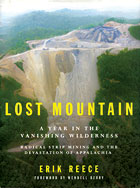 |
Author Henry Caudill once remarked ruefully that while North Carolina has the Biltmore and West Virginia has the Greenbrier, eastern Kentucky’s most popular tourist attraction is poverty.
In Lost Mountain: A Year in the Vanishing Wilderness (Riverhead Books, 2006), Erik Reece maintains that Kentucky’s coalfields primarily attract two kinds of people: well-intentioned idealists hoping to offer a fix for the region’s grinding poverty, and coal-industry operatives bent on stripping the land to the bone.
Caught in the middle is a third group: the ones who call the area home. Reece’s book, subtitled Radical Strip Mining and the Devastation of Appalachia, begins with his first visit to the aptly named Lost Mountain. Over the course of a year, he chronicles the transformation of this ridge into a gaping wasteland under the crush of explosives and heavy machinery. As the forested slope vanishes, Lost Mountain becomes a symbol not only of the Appalachian peaks routinely demolished by mountaintop-removal mining but of the communities that fade with them. Recounting the tales of folks who live in close proximity to these vast mines, Reece illuminates their distress at finding their tap water contaminated, their children’s respiratory health jeopardized and their complaints ignored.
The author, a Louisville native who is a professor of English at the University of Kentucky in Lexington, occasionally dons camouflage to hike Lost Mountain’s trails. On various snooping excursions he dodges a bulldozer, accidentally handles a copperhead, and carefully tracks every step of the mining process. Explosives, bulldozers and machines the size of skyscrapers are employed to literally uproot forests (the timber is often burned), scrape away layers of rock and soil, and extract the seams of coal beneath. The resulting mix of rubble is shoved into surrounding valleys, typically burying creeks. (At least 700 miles of healthy streams have disappeared beneath the debris from these mine sites, the U.S. Environmental Protection Agency estimates.)
Ironically, coal-rich eastern Kentucky is one of the most economically disadvantaged areas in the nation, with a 31 percent poverty rate that has stagnated for the past 40 years, Reece writes. He profiles the region’s history of failed revitalization plans, union battles and mine-related disasters, turning a spotlight on characters like the Widow Combs, a 60-year-old woman who was jailed for sitting in front of a bulldozer in 1965 to prevent a company from mining her property.
Mountaintop-removal mines are hours away from scenic Western North Carolina, conveniently out of sight. But even Asheville readers who aren’t all that environmentally minded are probably being served by Progress Energy’s coal-fired power plant in Skyland.
“Urban centers,” writes Reece, “should remember this: Central Appalachia is poor because so much has been taken and so little has been returned. The mountains of Appalachia are responsible for the illumination and air-conditioning of billions of houses, and neither the people nor the land has been properly compensated.”
And as community activist (and Harlan County native) Teri Blanton tells Reece: “You’re not an outsider. We all live downstream.”



Before you comment
The comments section is here to provide a platform for civil dialogue on the issues we face together as a local community. Xpress is committed to offering this platform for all voices, but when the tone of the discussion gets nasty or strays off topic, we believe many people choose not to participate. Xpress editors are determined to moderate comments to ensure a constructive interchange is maintained. All comments judged not to be in keeping with the spirit of civil discourse will be removed and repeat violators will be banned. See here for our terms of service. Thank you for being part of this effort to promote respectful discussion.